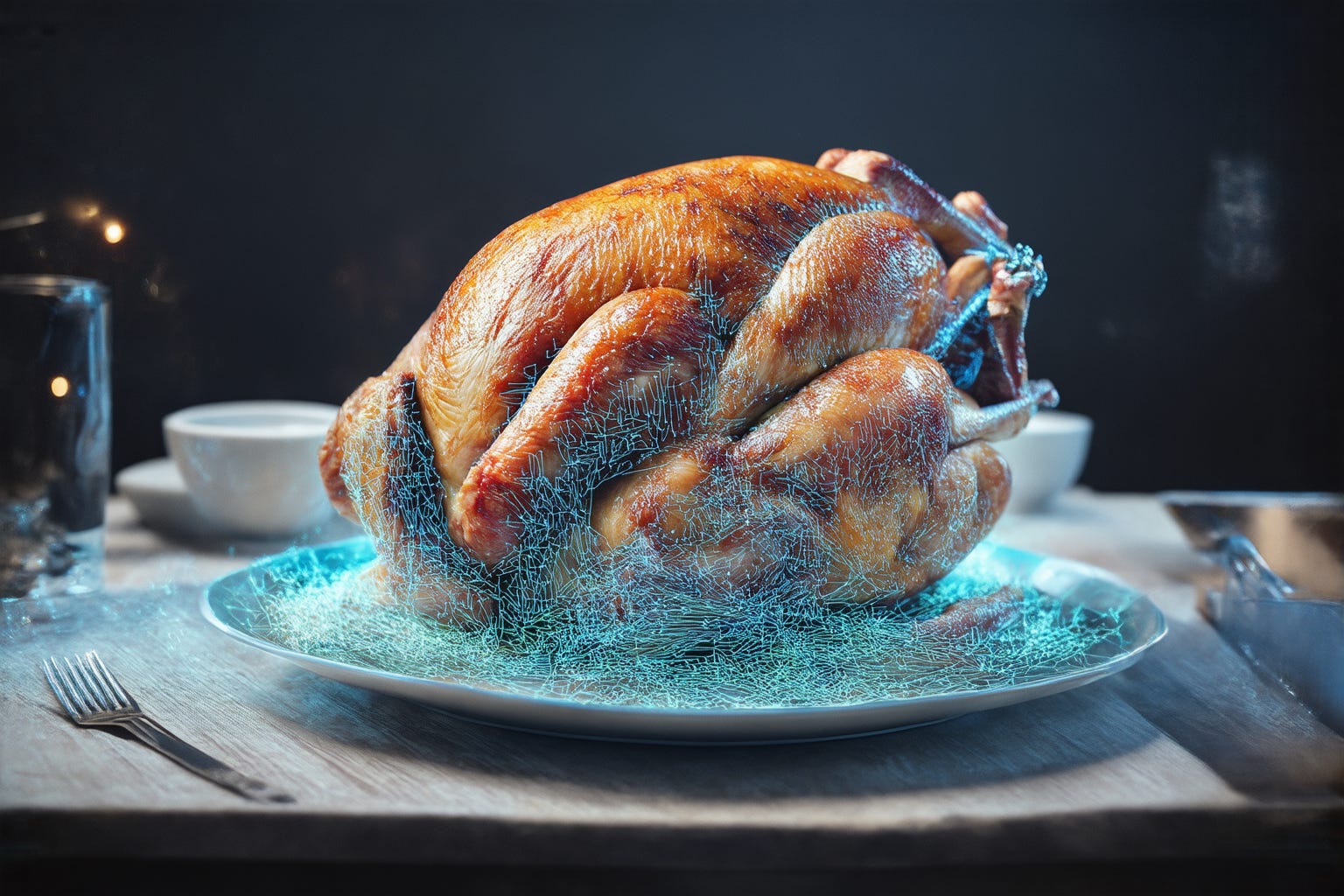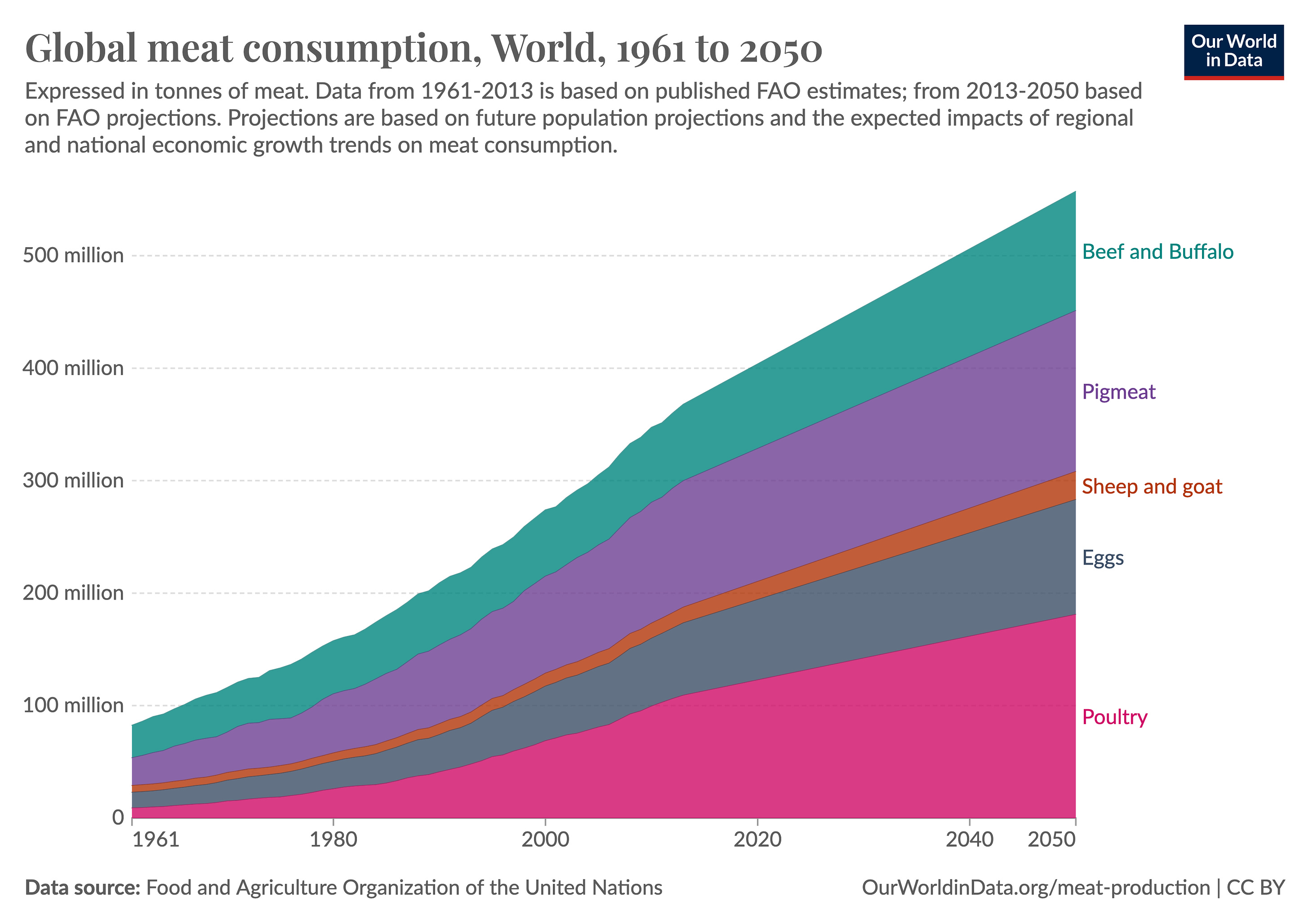Jeff Bezos wants AI to design your Thanksgiving turkey
Hi all—Arielle here. Happy Thanksgiving to all who celebrate! As many of us prepare stuff ourselves with turkey, I’m diving into one of the weirder ways scientists are proposing to address industrial meat pollution. Jeff Bezos wants AI to design your Thanksgiving turkeyThe Amazon billionaire is spending $100 million to design the perfect fake meat. Is it worth it?If you care about the climate this Thanksgiving, but you’re looking forward to gobbling down some turkey, Jeff Bezos has a proposition for you: let artificial intelligence design a tastier meat alternative. The billionaire has committed $100 million to the Bezos Centers for Sustainable Protein, where researchers will experiment with sustainable meat and dairy substitutes. Andrew Steer, head of the Bezos Earth Fund, most recently claimed at the U.N. climate summit last week that AI can “help design tastier alternative proteins” in an effort to fight climate change. “We’re not trying to turn everyone into vegetarians—we simply cannot keep eating meat at the growth rates we are now,” he said in a panel with Bloomberg. Climate scientists have been saying for years that the world needs to eat less meat to prevent dangerous levels of planetary heating. Livestock—particularly cattle—are responsible for anywhere from 11 to 20 percent of global emissions. Enter the meat alternatives: plant-based burgers, fermented fungi or algae products that mimic bloody meat, or even cultured meat produced from animal cells in a lab. But food scientists believe that AI can make those products appeal to far more people. Technically, using AI to grow alternative meat—a phrase that makes protein sound like a punk band—isn’t new. It’s been around for almost a decade, as scientists experiment with how to create something that looks and tastes like an actual meat product. But with the rapid expansion of AI, the race to find a tasty, nutritious meat alternative is ramping up. But do we really need AI—which has climate costs—to design our environmentally-friendly dinner? The race to create better fake meatBrowse the grocery aisle, and you’ll find Beyond Meat, Impossible Burgers, and more than a dozen other meat alternatives. So why do we need code to create even more meat alternatives? The truth is that consumers just aren’t buying it. Americans especially, who can put away 100 pounds of meat a year without a (meat) sweat, spent relatively little on plant-based products, which made up a paltry 0.9 percent of overall meat sales last year. That’s not to say they don’t like them at all—the U.S. plant-based meat market alone was worth $1.2 billion in 2023, according to the Good Food Institute. But that’s small potatoes compared to growing demand for good old fashioned meat. By 2050, the United Nations estimates that the demand for meat will have doubled—particularly in wealthy countries. “There's no planet left if we deliver that 50 percent growth with the kind of business as usual approach,” said Andy Jarvis, the Bezos Earth Fund’s Director of Future of Food. “We think of this as a kind of all hands on deck.” Hence the worldwide race to create better fake meat, a market that people think could take off, if only they can get the combination of taste and price just right. Currently, plant-based alternatives cost two to four times more than regular meat, and taste weirder to people used to eating beef, pork, poultry, or seafood, according to GFI. A poll last year found that half of U.S. adults who tried eating plant-based meat once never tried it again because—you guessed it—taste. Those first attempts to create fake meats, like the products you can buy in the grocery store, are “cooking experiments to an extent. They're trial and error,” said Jarvis. Each attempt is a shot in the dark at finding a meat substitute that can combine the right taste, the right texture, and the same nutritional benefits as animal products. “But with AI, what you can do is just make that cooking experiment into a much more precise process,” he said. Here’s how that works: Take plant-based meats, which are currently made from a limited set of crops. AI can instead search a vast library of plant proteins and find something that’s more closely matched to an animal protein—a process that might take scientists years manually. Or, scientists that grow meat from animal cells can use AI to lower costs by finding the best growing conditions or culture ingredients.
Amin Nikkhah, an agriculture and environment professor at Tufts University, works at the first lab to get the U.S. Department of Agriculture’s approval to create meat from animal cells. One of the goals of creating “cultivated” meat, he said, is to reach people who enjoy a steak dinner—not just vegetarians. “This cell-cultivated meat is for people like me, who don’t want to give up eating meat,” said Nikkhah. “So if we give that person something that looks like a steak, tastes like a steak, I would say most people would be happy with it.” If you’ve read about the climate impact of AI before, you might be thinking, wait, isn’t AI bad for the planet? And in certain cases, it is. Large language models like ChatGPT-4 use so much energy that they may be one of the driving forces behind keeping coal plants and methane gas plants online. But AI comes in a lot of different forms—not just energy-sucking models. In this case, researchers use AI to compute all the many variables that go into creating a tasty meat product—fat, texture, taste, and so many more. “These are things that I run on my personal computer that take a couple of minutes to train,” said Skyler St. Pierre, a doctoral student at Stanford University and lead author of a study on creating better meat alternatives. Those small-data models are “not anywhere near the ChatGPT and the massive energy requirements of large-realm AI,” he said. St. Pierre said artificial intelligence can save scientists a lot of time by quickly analyzing patterns in large datasets of taste preferences. “We’re trying to find the same fiber structures or pockets of juicy fat in a steak that make people really love that taste and flavor,” he said. The allure of AI is that it could find the perfect combination of ingredients that will convince even hard-core meat eaters to try something new. That doesn’t mean that AI is perfect, or that the full implications of its use are understood. “Whenever a new tool comes out and people sort of throw around the sentiment that this is going to save everything, I think that's something to inquire more deeply about,” said Bianca Datta, a food scientist and the scientific partnerships manager at the environmental nonprofit Good Foods Institute. Datta said she is excited about the potential applications of AI for climate solutions. “I think it could really speed up the rate of progress that we're seeing in the field,” she added. “And I also think it is a really emerging area and there's so much about it that we don't know in terms of the applications from a climate perspective.” Indeed, even without AI, there are environmental costs to meat alternatives. “There is no net zero food production system,” said Nikkhah. But some are better than others: cell-cultivated meat has 92 percent less global warming potential than beef from cattle, while plant-based meats have 89 percent less impact on the environment than animal agriculture. Changing diets with “hope and joy, as opposed to guilt.”A world where we all eat meat that’s made by scientists, instead of raised in a field, may sound like a planet-friendly future to some, perhaps on par with a world where all our energy comes from renewable energy. But researchers told me they don’t expect alternative protein to replace animal protein—even the Bezos Earth Fund stopped short of claiming that they could get rid of meat altogether. “I can't ever see it basically being an end to animal agriculture,” said Jarvis. This may be the truth, or it may be a response to people who think their steak is going to be taken away by liberal elites. This year, Alabama and Florida banned lab-grown meat, even though it's not available for sale. President-elect Donald Trump falsely claimed on the campaign trail that Vice President Kamala Harris wanted to “stop people from eating red meat.” The backlash isn’t limited to the United States—Italy also banned cultivated meat last year, and France is considering similar bans. But researchers say they’re not trying to take anything away. Rather, they’re trying to give people the freedom to choose more sustainable proteins and dairy products, if they want them. “What we're looking for in the immediate term is can we meet some of that increasing demand with much lower footprint alternatives,” said Jarvis. It remains to be seen if that will be enough. Current demand for meat is already pushing the planet on track to to heat to 2.6 degrees Celsius, well beyond the original climate target that was meant to prevent the worst effects of climate change. So if we’re spending all this time and energy and money on creating fake meat, it begs the question: why can’t we just simply consume less meat? “I do think it’s concerning that the way that we consume it often feels like it’s not super mindful,” said Datta. But “trying to fully shift consumer behavior without any support is basically fighting a losing battle.” Food can feel very personal, she pointed out—people have health concerns, or may have allergies to alternatives. Meat dishes are central in many holidays and cultures, and animal agriculture is especially important in developing countries. Instead of asking people to give something up, Datta said she is looking forward to giving them more food to include. “In terms of my personal philosophy, I really prefer to bring people in from a place of hope and joy, as opposed to guilt,” she said. It’s more sustainable, she added, on both a planetary and individual level, to say “Hey, we’re building this cool future. Do you want to be part of it?” Further reading:
Catch of the day: We are so grateful to reader Phoebe for sending us good girl Noel. Climate change is very scary for snow-loving Noel, but she finds comfort in snuggling with her best friend Banana Duck. Thank you to our readers for sharing their best buds with us! Want to see your furry (or non-furry!) friend in HEATED? Just send a picture and some words to catchoftheday@heated.world. Invite your friends and earn rewardsIf you enjoy HEATED, share it with your friends and earn rewards when they subscribe. |
Older messages
D.C. news station quietly scrubs stories on gas stove health dangers
Wednesday, November 27, 2024
Advocates say Washington Gas, a WUSA9 sponsor, pressured the station to take down the stories. "News is absolutely being suppressed," one advocate said. ͏ ͏ ͏ ͏ ͏ ͏ ͏ ͏ ͏ ͏ ͏ ͏ ͏ ͏ ͏ ͏ ͏ ͏ ͏
COP29 smells like oil
Thursday, November 21, 2024
What's happening—and not happening—at the biggest and most influential climate summit in the world. ͏ ͏ ͏ ͏ ͏ ͏ ͏ ͏ ͏ ͏ ͏ ͏ ͏ ͏ ͏ ͏ ͏ ͏ ͏ ͏ ͏ ͏ ͏ ͏ ͏ ͏ ͏ ͏ ͏ ͏ ͏ ͏ ͏ ͏ ͏ ͏ ͏ ͏ ͏ ͏ ͏ ͏ ͏ ͏ ͏ ͏ ͏ ͏ ͏
Trump's entire Cabinet misrepresents climate change
Wednesday, November 20, 2024
I analyzed the public statements of each nominee. It was awful. (Though Matt Gaetz was surprising?) ͏ ͏ ͏ ͏ ͏ ͏ ͏ ͏ ͏ ͏ ͏ ͏ ͏ ͏ ͏ ͏ ͏ ͏ ͏ ͏ ͏ ͏ ͏ ͏ ͏ ͏ ͏ ͏ ͏ ͏ ͏ ͏ ͏ ͏ ͏ ͏ ͏ ͏ ͏ ͏ ͏ ͏ ͏ ͏ ͏ ͏ ͏ ͏ ͏ ͏ ͏
Trump's environmental assault begins
Tuesday, November 12, 2024
Here's how activists envision the fight ahead. ͏ ͏ ͏ ͏ ͏ ͏ ͏ ͏ ͏ ͏ ͏ ͏ ͏ ͏ ͏ ͏ ͏ ͏ ͏ ͏ ͏ ͏ ͏ ͏ ͏ ͏ ͏ ͏ ͏ ͏ ͏ ͏ ͏ ͏ ͏ ͏ ͏ ͏ ͏ ͏ ͏ ͏ ͏ ͏ ͏ ͏ ͏ ͏ ͏ ͏ ͏ ͏ ͏ ͏ ͏ ͏ ͏ ͏ ͏ ͏ ͏ ͏ ͏ ͏ ͏ ͏ ͏ ͏ ͏ ͏ ͏ ͏ ͏ ͏ ͏
1.5C is dead. The climate fight isn’t.
Thursday, November 7, 2024
Trump's re-election is “the final nail in the coffin” for the Paris Agreement's North Star goal, nine experts told HEATED. But we can still limit the damage. ͏ ͏ ͏ ͏ ͏ ͏ ͏ ͏ ͏ ͏ ͏ ͏ ͏ ͏ ͏ ͏ ͏ ͏
You Might Also Like
Win Two Tickets To A Major Music Festival & A Shopping Spree!
Thursday, February 27, 2025
Thanks To Marshalls. Feb. 27, 2025 Bustle Daily Enter To Win Tickets To A Major Music Festival, Thanks To Marshalls Presented by Marshalls Enter To Win Tickets To A Major Music Festival, Thanks To
Cat Story
Thursday, February 27, 2025
How we got that cat ͏ ͏ ͏ ͏ ͏ ͏ ͏ ͏ ͏ ͏ ͏ ͏ ͏ ͏ ͏ ͏ ͏ ͏ ͏ ͏ ͏ ͏ ͏ ͏ ͏ ͏ ͏ ͏ ͏ ͏ ͏ ͏ ͏ ͏ ͏ ͏ ͏ ͏ ͏ ͏ ͏ ͏ ͏ ͏ ͏ ͏ ͏ ͏ ͏ ͏ ͏ ͏ ͏ ͏ ͏ ͏ ͏ ͏ ͏ ͏ ͏ ͏ ͏ ͏ ͏ ͏ ͏ ͏ ͏ ͏ ͏ ͏ ͏ ͏ ͏ ͏ ͏ ͏ ͏ ͏ ͏ ͏ ͏ ͏ ͏ ͏ ͏ ͏ ͏ ͏ ͏
Selena Gomez Just Won The Red Carpet At The 2025 BAFTAs In An Iconic Gown
Thursday, February 27, 2025
WOW. The Zoe Report Daily The Zoe Report 2.16.2025 Selena Gomez Won The Red Carpet At The 2025 BAFTAs In An Iconic Gown (Red Carpet) Selena Gomez Won The Red Carpet At The 2025 BAFTAs In An Iconic Gown
"European" Means "I Want To Walk"
Thursday, February 27, 2025
When we mistake concrete ideas for abstract ones ͏ ͏ ͏ ͏ ͏ ͏ ͏ ͏ ͏ ͏ ͏ ͏ ͏ ͏ ͏ ͏ ͏ ͏ ͏ ͏ ͏ ͏ ͏ ͏ ͏ ͏ ͏ ͏ ͏ ͏ ͏ ͏ ͏ ͏ ͏ ͏ ͏ ͏ ͏ ͏ ͏ ͏ ͏ ͏ ͏ ͏ ͏ ͏ ͏ ͏ ͏ ͏ ͏ ͏ ͏ ͏ ͏ ͏ ͏ ͏ ͏ ͏ ͏ ͏ ͏ ͏ ͏ ͏ ͏ ͏ ͏ ͏ ͏ ͏ ͏ ͏
Sketched Buk Brings the Brilliance of Gold to Bangkok
Thursday, February 27, 2025
Thailand's Buk overcomes challenges to make glass gilding an important part of his design practice. BLAG Magazine: Adventures in Sign Painting Craft, Community & Culture Sketched Buk Brings the
Have You Seen the Panda Cam? 🐼
Thursday, February 27, 2025
— Check out what we Skimm'd for you today February 17, 2025 Subscribe Read in browser Header Image But first: the best Presidents Day sales to shop today Update location or View forecast
“The Lord is American” by W. J. Lofton
Thursday, February 27, 2025
The world undresses / its wounds. It wounds. ͏ ͏ ͏ ͏ ͏ ͏ ͏ ͏ ͏ ͏ ͏ ͏ ͏ ͏ ͏ ͏ ͏ ͏ ͏ ͏ ͏ ͏ ͏ ͏ ͏ ͏ ͏ ͏ ͏ ͏ ͏ ͏ ͏ ͏ ͏ ͏ ͏ ͏ ͏
Jeff Bezos Makes a Damning Case Against Corporate Media
Thursday, February 27, 2025
The decision to exile dissenting views from the Post opinion pages shows he puts Amazon's business over journalism ͏ ͏ ͏ ͏ ͏ ͏ ͏ ͏ ͏ ͏ ͏ ͏ ͏ ͏ ͏ ͏ ͏ ͏ ͏ ͏ ͏ ͏ ͏ ͏ ͏ ͏ ͏ ͏ ͏ ͏ ͏ ͏ ͏ ͏ ͏ ͏ ͏ ͏ ͏ ͏ ͏
Fit Is Better Than Thin
Thursday, February 27, 2025
The fit versus fat debate, cold plunging, new tech and your recommendations. ͏ ͏ ͏ ͏ ͏ ͏ ͏ ͏ ͏ ͏ ͏ ͏ ͏ ͏ ͏ ͏ ͏ ͏ ͏ ͏ ͏ ͏ ͏ ͏ ͏ ͏ ͏ ͏ ͏ ͏ ͏ ͏ ͏ ͏ ͏ ͏ ͏ ͏ ͏ ͏ ͏ ͏ ͏ ͏ ͏ ͏ ͏ ͏ ͏ ͏ ͏ ͏ ͏ ͏ ͏ ͏ ͏ ͏ ͏ ͏ ͏ ͏
Why Does The Bad Guy Feel Like The Victim?
Thursday, February 27, 2025
Thoughts on the psychology of sympathizing with petty wrongdoers ͏ ͏ ͏ ͏ ͏ ͏ ͏ ͏ ͏ ͏ ͏ ͏ ͏ ͏ ͏ ͏ ͏ ͏ ͏ ͏ ͏ ͏ ͏ ͏ ͏ ͏ ͏ ͏ ͏ ͏ ͏ ͏ ͏ ͏ ͏ ͏ ͏ ͏ ͏ ͏ ͏ ͏ ͏ ͏ ͏ ͏ ͏ ͏ ͏ ͏ ͏ ͏ ͏ ͏ ͏ ͏ ͏ ͏ ͏ ͏ ͏ ͏ ͏ ͏ ͏ ͏ ͏ ͏



